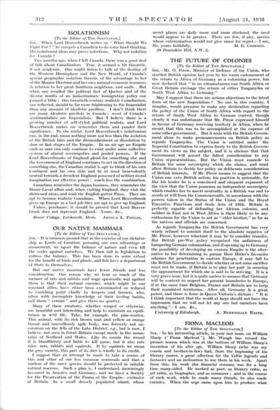THE FUTURE OF COLONIES
[To the Editor of THE SPECTATOR.]
Sni,—Mr. 0. Pirow, Minister of Defence of the Union, who startled British opinion last year by his warm endorsement of the return to Africa of Germany as a colonising power, has now declared that " in no circumstances can South Africa or Great Britain envisage the return of either Tanganyika or South West Africa to Germany."
May I suggest that there are serious objections to the latest form of the new Imperialism ? No one in this country, I imagine, would presume to make any declaration regarding the policy of the Union of South Africa with regard to the return of South West Africa to German control, though clearly it was unfortunate that Mr. Pirow expressed himself in favour of Germany receiving territory in Africa, when he meant that this was to be accomplished at the expense of some other government. But it rests with the British Govern- ment alone to make pronouncements on British policy as regards Tanganyika. The Union is entitled under the Imperial Constitution to express freely to the British Govern- ment its views on the subject, and it is obvious that that Government will accord the fullest consideration to any Union representations. But the Union must concede to Britain the same sovereignty which she claims, and must allow Britain to decide her policy on deliberate consideration of British interests. If Mr. Pirow means to suggest, that the Union can veto British action, his position is untenable, for like his leader he is a convinced and eloquent exponent of the view that the Union possesses an independent sovereignty which enables her to assert neutrality in a British war and to secede at will from the Commonwealth, in accordance with the powers taken in the Status of the Union and the Royal Executive Functions and Seals Acts of 1934. Britain is perfectly capable of defending her African colonies, and neither in East nor in West Africa is there likely to .be any enthusiasm for the Union to act as " elder brother," so far as the natives and officials are concerned.
As regards Tanganyika the British Government has very wisely refused to commit itself to the absolute negative of Mr. Pirow, however reluctant it may be to consider transfer. But British pre-War policy recognised the unfairness of hampering German colonisation, and if opening up to Germany the possibility of developing an oversee Empire is the alter- native to her determining to pursue Herr Hitler's favourite schemes for penetration in eastern Europe, it may fall to the British Government to decide whether or not some sacrifice must not be made, if Britain is to play her part in securing the appeasement for which she is saki to be striving. It is a very grave issue, but it is quite useless to assume that Germany will be content to respect her present boundaries in Europe, if at the same time Belgium, Prance and Britain are to keep their mandated territories. After all, Germany is a great power, and there is force in Queen Victoria's dictum : " It is I think important that the world at large should not have the impression that we will not let any one but ourselves have anything."—I am, &c.,






































 Previous page
Previous page